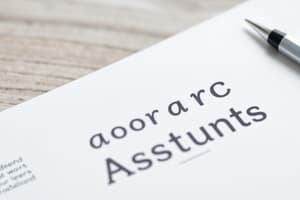Podcast
Questions and Answers
An abstract should be _____, concise, factual, and detailed.
An abstract should be _____, concise, factual, and detailed.
brief
The IMRAD structure includes Introduction, Methodology, Results, and _____ for discussions.
The IMRAD structure includes Introduction, Methodology, Results, and _____ for discussions.
discussions
You should write an abstract upon completing a thesis or _____ submission.
You should write an abstract upon completing a thesis or _____ submission.
dissertation
In the methodology section, it is essential to indicate the research _____ used to answer your question.
In the methodology section, it is essential to indicate the research _____ used to answer your question.
The results section can contain a summary of main findings in the present or _____ simple tense.
The results section can contain a summary of main findings in the present or _____ simple tense.
A ______ statement is a concise and specific summary of the main idea of an essay.
A ______ statement is a concise and specific summary of the main idea of an essay.
Paraphrasing involves rewriting a text in your own ______ while maintaining the main idea.
Paraphrasing involves rewriting a text in your own ______ while maintaining the main idea.
Skimming is a reading technique that allows you to read quickly to get a ______ idea of the content.
Skimming is a reading technique that allows you to read quickly to get a ______ idea of the content.
In the framework CER, the 'C' stands for ______, which is the main argument of the essay.
In the framework CER, the 'C' stands for ______, which is the main argument of the essay.
To preview a text, one should start by reading the ______ and subheadings.
To preview a text, one should start by reading the ______ and subheadings.
Flashcards are hidden until you start studying
Study Notes
Abstract Writing
- An abstract provides a concise summary of academic work including theses, dissertations, and research papers.
- The IMRAD structure is commonly used for abstracts:
- I - Introduction: Define research purpose and address practical/theoretical problems.
- M - Methodology: Describe research methods in straightforward manner, typically in past simple.
- R - Results: Summarize main findings, using either present or past simple tense.
- A - Discussions: Discuss main conclusions and answers to research questions.
- Abstracts are written after completing research or when submitting papers for academic purposes.
Outlining
- Outlining helps in organizing thoughts and structure for writing.
- Two types of outlines:
- Reading outline: Extracts main ideas and aids in critically analyzing the text.
- Writing outline: Serves as a skeletal guide to organize ideas before drafting an essay.
Thesis Statement
- A thesis statement is concise, specific, and captures the main idea of the essay.
- Should present an arguable claim supported by evidence.
- Typically located in the introductory paragraph and avoids first-person language.
Paraphrasing
- Involves rewriting text in the writer's own words while maintaining the main idea.
- Important for avoiding plagiarism and enhancing vocabulary.
- Steps for effective paraphrasing include:
- Reading the passage carefully.
- Identifying the main idea.
- Highlighting important words.
Poetic Devices
- Involves altering sentence structure or order, finding synonyms, and converting between active and passive voice.
- Active voice puts the subject in action, while passive voice highlights the action's recipient.
Importance of Reading
- Aids in discovering new concepts, expanding vocabulary, and achieving academic success.
- Provides escapism and allows for previewing content to gather information before reading.
Previewing Text
- Previewing activates prior knowledge, sets reading goals, studies vocabulary, and predicts information.
- Steps to effectively preview a text include reading the title, headings, and visuals, and skimming for key terms.
Skimming and Scanning
- Skimming allows quick reading for a general understanding; scanning focuses on locating specific information.
- Techniques for each include:
- For skimming: Read quickly, focusing on the first and last paragraphs.
- For scanning: Search for keywords without extensive reading.
Claim, Evidence, Reasoning (CER Framework)
- CER provides a structured approach to forming opinions in writing.
- Claim: The main argument of the essay, which can be a claim of fact, value, or policy.
- Evidence: Supports the claim with qualitative or quantitative data.
- Reasoning: Connects the evidence to the claim, explaining its relevance.
Studying That Suits You
Use AI to generate personalized quizzes and flashcards to suit your learning preferences.




